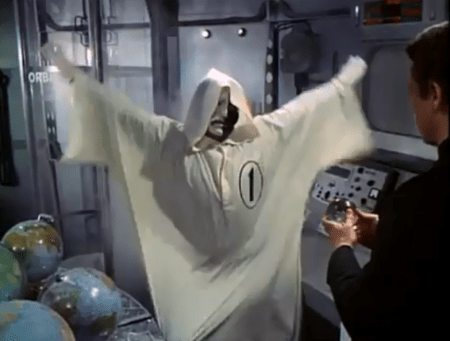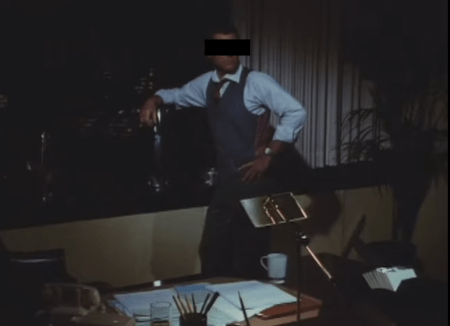“█████ turns up in series ███ doesn’t he?”
“Oh… for hump’s sake!” [ii]
“Sorry… I thought you know.”
That was a brief domestic conversation with my wife last night. We’re well-suited and very lucky and very █████ed in that respect. We tend to talk less about interest rates and brands of cleaning products as opposed to television formats and viewing schedules. We’re currently two of the few people in the country actually watching ████ ████: █████████ (████-) on ██. We’re only on series ███ at the moment, and she’d come out with a glimpse ahead into the show’s future that I hadn’t been aware of and might – in due course – have been mildly surprised by had I reached it without prior knowledge.
At what point should I have had this surprise? I don’t know, because I’ve not seen the episodes in question yet so I don’t know when the producers intended me to have the surprise. Was there a press bulletin in advance of the original broadcast to make █████ a selling point to get me to watch in the first place? Is the episode title a dead giveaway when it turns up on screen and informs me of █████’s Return? Will the opening credits inform me that guest stars include █████ ████ as █████ so I’ll be expecting ███ when ██ appears… or will ██ already have appeared in the pre-credits as the bait on the hook to reel me in for the next hour?
Incidentally, I really don’t want any of you to have this narrative twist ████ed in the same way that it was – albeit with love and devotion – for me. So, as you can see, I’m taking all proper redactive precautions to not only avoid telling you what the surprise was, but not even allude to the fact that there is a surprise in whatever season of whatever series it is that my wife and I are indeed currently watching on whatever channel we’re tuned to.
Now, I’m sure that this isn’t classified information. It’s general stuff that’s just out there. Probably on Wikipedia. Yes – there it is. And my wife, when she’s watching stuff, does like to check things on Wikipedia. [iii] So this isn’t stuff that she’s signed an NDA with some broadcaster for that she’s now happily breaking by blowing the gaffe to her spouse over a slice of pizza while catching up on recordings on the hard-drive. It’s just a fact that’s not percolated down to me yet. Despite the fact that this revelation is actually quite recent – just over a year old.
But is that old or not? I don’t know any more. I mean, here, today, I know that I must be very careful not to tell people that in the episode of Doctor ███ (████-████,████,████-) which aired two nights ago, it was revealed that █████ to ███████ ████████ there had been a whole stack of ███████ ██████s. That would be bad form because – like trying to follow Man in a Suitcase (1967-1968) on the ITV regions in the 1960s, different people are watching different episodes on different days across the country… albeit because of the erratic nature of franchised scheduling rather than domestic recording. And I want them to enjoy that episode of Doctor ███ every bit as much as we did, because of its surprises. And two days does seem ‘new’ to me.
This is one of the downsides to the amazing situation we now find ourselves in where so much television from the past – from the 1950s right up to yesterday – is now available to us. Thinking back to the days of PrimeTime, we didn’t have that luxury. If a show went out in the 1960s, you might get a repeat in an off-peak slot from BBC2 or your local ITV station if you were lucky, but certainly we never imagined that anybody was ever going to hand these to you on DVDs or Freeview channels… mainly because we didn’t know what DVDs or Freeview channels were. Television was something you either saw at the moment… or, that was it, sorry, that boat has sailed.
Which is why back in 1976 I knew that in the last episode of The Prisoner (1967-1968), Number 1 turned out to be Number 6. Page 124 of Fantastic Television (1976) – go look it up. Now, some of you will know how much I admire Gary Gerani, and he wouldn’t have deliberately given away this climactic twist to upset me and diminish the effect of finally getting to see a grotty off-air Betamax copy of Fall Out some seven years later.
And did you notice how I didn’t redact any of that? Well, that’s because you’re all nice academic people with PhDs and things and this is one of the upsides to academic writing which I rather value. If you were bothered about a show made over 50 years ago – but still readily available on Blu-Ray at a bargain price – I think you’d have watched it already. And if you haven’t seen it, you’d most likely be going to watch it with a slightly disconnected academic approach rather than seriously going along with the thrills and spills of it all.
Indeed, academia has made the same reveal many times without the universe coming to an end. Page 63 of Telefantasy (2005) by Catherine Johnson. Check it out! Cathy’s brilliant! [iv]
But that’s a bonus with academic writing – you can give away the endings and twists to analyse and study them. You cannot do so otherwise. In the commercial and fan spheres, the fact that the past has now become another series of simultaneous presents can make every statement a potential minefield because we don’t know which members of our audience are on which page of the book, or which facts are ‘general knowledge’.
I mean. Who shot █.█.? I didn’t even watch ██████ (19██-19██) when it aired on the ███ at the time, but I did see the news and – take it from me – there was no way that you could escape a) knowing that █.█. had been shot and b) hearing that it was ███████ who shot █.█. … despite the fact that you didn’t know who either █.█. or ███████ were and cared less. It’s a bit like just knowing that ███████ the Conqueror won at the Battle of ████████.
But are there people out there now working their way through their DVD box sets who know neither that █.█. gets shot or who the shooter was and would rather not know until they’ve reached the episodes █ █████ ███████ or ███ ████ ██?
And while academia has this upside, so does ageing. The great thing with now being in my fifties is that I’m well aware that my memory is slowly getting humped [v]. So, although I was informed last night that █████ will be appearing in season ███ of ████ ████: █████████, I’m rather hopeful that by the time I get to actually watching season ███ of ████ ████: █████████, I’ll have forgotten that I ever knew ██ was in it and I can be surprised all over again. As I hope will you.
I just hope they get his ears right.
_________________________________________________________________________________
Andrew Pixley is a retired data developer. For the last 30 years he’s written about almost anything to do with television if people will pay him – and occasionally when they won’t. And he daren’t even tell you about the other stuff that he’s done previously because that might █████ the surprise for you when you finally discover it in your own timeline.
Footnotes:
[i] Well, apart from the odd ‘hump’ and you’ll be past that soon anyway because it’s in the first few lines. Sorry, probably shouldn’t have told you that. It goes against the theme of the piece.
[ii] See. Not too bad was it? That’s the strong language over and done with [vi].
[iii] Because that’s what normal people do when they’re watching a television show isn’t it? They check things. Running orders, production sequences, stuff like that. Normal, everyday stuff.
[iv] Well you’d better buy a copy then hadn’t you?
[v] Sorry, there was another one.
[vi] Damn! Shouldn’t have told you that. And, anyway, I was wrong, wasn’t I?









You’re kidding? Mr Rumbold’s going to appear? Hardly worth watching now you’ve given that away!